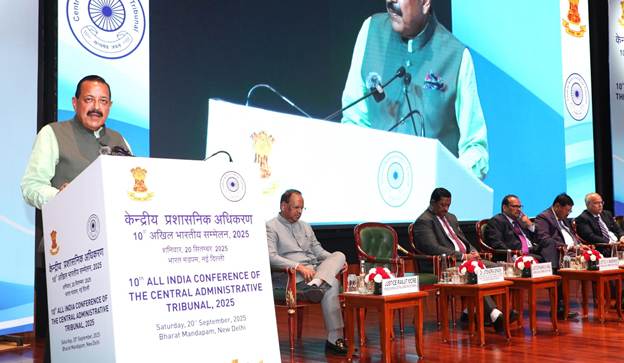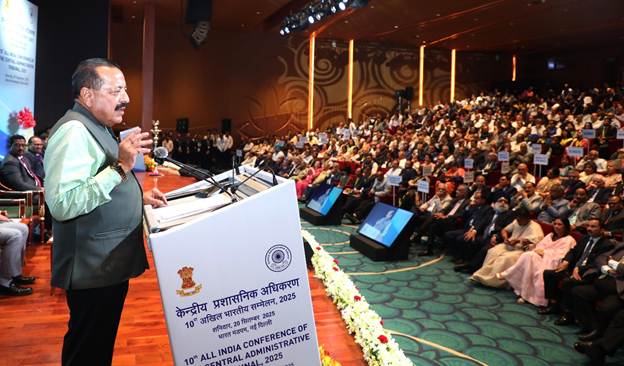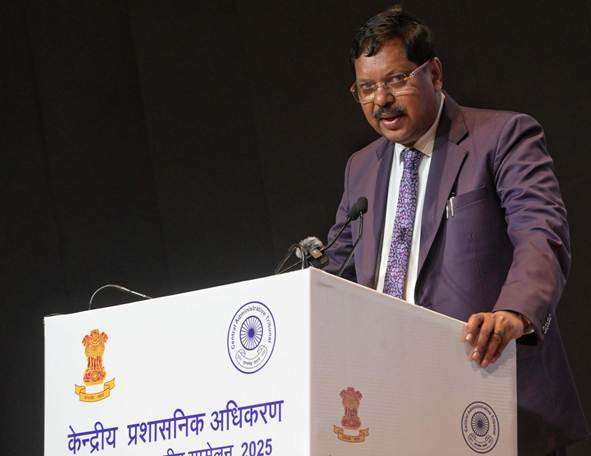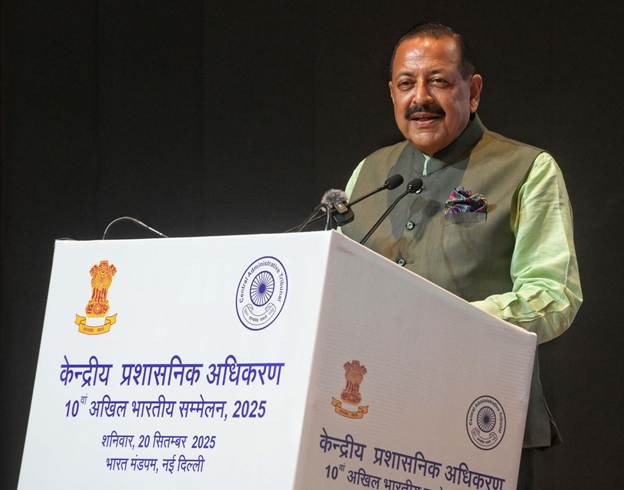Ministry of Personnel, Public Grievances & Pensions
Curtail Avoidable Appeals to Uphold CAT’s basic original Mandate, Says Jitendra Singh
Minister Urges Judiciary to Volunteer for CAT Assignments in Service of Nation
AI, Digitisation and Performance Benchmarks on CAT’s Future Roadmap
प्रविष्टि तिथि:
20 SEP 2025 4:06PM by PIB Delhi
Union Minister of State (Independent Charge) for Science and Technology; Earth Sciences and Minister of State for PMO, Department of Atomic Energy, Department of Space, Personnel, Public Grievances and Pensions, Dr. Jitendra Singh today urged all concerned to help ensure that the Central Administrative Tribunal (CAT) fulfills its basic original mandate of reducing the backlog of service-related cases in higher courts. He emphasised the need to find ways of avoiding avoidable appeals in High Courts, noting that the very purpose of CAT was to provide finality at the tribunal level for ease of justice to employees and to streamline judicial procedures.
Speaking at the 10th All India Conference of the Central Administrative Tribunal at Bharat Mandapam, Dr. Jitendra Singh urged members of the judiciary to voluntarily come forward to take up assignments in CAT “in the interest of administration of justice and in the service of the nation.” He observed that reluctance to accept such roles had, in the past, compelled amendments to the Tribunal’s functioning, including permitting administrative members to head benches in the absence of judicial members.
Dr. Jitendra Singh reminded the gathering that CAT was set up in 1985 under Article 323-A of the Constitution to provide speedy, inexpensive justice to government employees and pensioners, while also relieving High Courts of the heavy burden of service-related litigation.
The Minister underlined that the Government, under Prime Minister Narendra Modi’s leadership, had ensured that all vacancies in the Tribunal were filled, allowing it to function at full strength. The next challenge, he said, was to clear pending cases in a time-bound manner and to adopt modernised case management systems.
Highlighting the growing role of technology in judicial processes, Dr. Jitendra Singh pointed to progress in e-filing, digitisation of records, and virtual hearings, which had ensured continuity even during the pandemic. He also spoke of plans for AI-enabled case management systems to support faster and more consistent adjudication, without compromising judicial independence.
Dr. Jitendra Singh suggested that CAT could adopt performance benchmarking across its benches, with parameters such as disposal rates, pendency reduction, use of technology, and litigant satisfaction. Such measures, he said, would encourage the sharing of best practices and improve transparency.
Underscoring the Government’s commitment, he noted that most CAT benches now had dedicated premises and that efforts were ongoing to further strengthen infrastructure and manpower. He concluded by stressing that while the government can provide resources and technology, integrity and a sense of service remain the responsibility of those entrusted with justice delivery.
Chief Justice of India, Justice B.R. Gavai, in his inaugural address, underlined the vital role played by the Central Administrative Tribunal (CAT) in easing access to justice and reducing the burden on higher courts. Justice Gavai proposed that government departments set up nodal offices to review cases before deciding on further litigation. He further encouraged the use of Artificial Intelligence for case categorisation and translation of judgments into multiple languages, along with the creation of a National Database for Tribunals.
In his welcome address, Justice Ranjit More, Chairman of the Central Administrative Tribunal, spoke about the unique role and needs of the Tribunal as distinct from regular courts. He traced the background of the Administrative Tribunals Act, 1985, and explained the growth of CAT with its benches and circuit benches across the country, set up with the vision of delivering justice at the doorsteps of litigants. He emphasised the Tribunal’s expanding role in service jurisprudence and its importance in ensuring timely and accessible justice under the leadership and support of the Government.
Union Law Minister Arjun Ram Meghwal noted that while CAT judgments are commendable, the cycle of appeals by either side delays justice and must be checked, adding that digital case management and transparency are crucial to reform. Attorney General R. Venkataramani reflected on the evolution of CAT into a credible institution and stressed that the quality of appointments is key to its success, also calling for more workshops and capacity-building for Tribunal members. The event was also attended by Supreme Court judges Justice J.K. Maheshwari, Justice Satish Chandra Sharma, Justice Prasanna B. Varale, and Justice Vijay Bishnoi, along with judges of various High Courts, senior officials of the Government of India, members of Bar Councils and Associations, and representatives of the legal fraternity




***
NKR/PSM
(रिलीज़ आईडी: 2168922)
आगंतुक पटल : 290